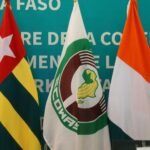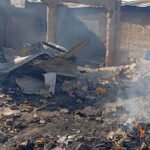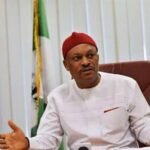Nigeria’s Crossroads: Justice for IDPs or a Legacy of Failure?
By Mike Arnold, MBA
Mayor of Blanco, Texas, USA
Co-founder and CEO of Africa Arise International
I love Nigeria and have the highest hopes for the nation’s future. I’ve demonstrated this through the time and resources I’ve invested in serving the people of Nigeria, without ever asking for or taking anything in return.
Currently, I am on my 15th visit to Nigeria since 2010. My dearest friends, most respected colleagues, and cherished brothers and sisters are Nigerians.
Back home in the U.S., I’m a tireless advocate for this country I consider my second home. I’ve brought many other Americans to Nigeria, and each has left with the same admiration and hope for its future.
The Nigerians I’ve come to know are dedicated to integrity, education, entrepreneurship, self-reliance, and traditional values. These traits, along with Nigeria’s abundant natural resources, should be propelling the country to historic global greatness.
So why isn’t Nigeria rising?
A quick look at the heart of the Federal Capital Territory (FCT) reveals the problem. The Nigerian government is neglecting its most fundamental responsibility: Protecting the basic rights of its people.
This Wednesday, I spent most of the day in the New Kuchingoro IDP camp in Abuja, helping displaced families find temporary shelter after their makeshift homes were demolished to make way for a developer. They had only four days’ notice and were given no alternatives. The ongoing trauma these people experience is unimaginable.
These were not squatters. They build their homes there with the government’s knowledge and approval, after fleeing the violence and destruction caused by Boko Haram. New Kuchingoro is just one of at least 13 such camps in the FCT, where people live in dire conditions, ignored by the government.
Most of the residents of this camp escaped the Gwoza Massacre over a decade ago. Tens of thousands fled to Abuja with nothing, and they’ve been trapped in inhumane conditions ever since, receiving no government support.
Estimates of internally displaced persons (IDPs) in Nigeria range from 2.5 million to over 9 million. For most, their homelands remain occupied by terrorists, with conditions even worse than the hellish camps they now inhabit.
A Shameful Neglect
While the government has spent vast resources lavishing money, stipends and even jobs on the very people responsible for these atrocities, the victims have been neglected. The previous administration under President Buhari sought to minimize this crisis (which swept him into office), labeling these survivors as “vagrants” and “criminals” to justify their oppression. As a result, even most Nigerians don’t grasp the magnitude of this ongoing and growing tragedy.
I personally know many of these IDPs. The ones I know are hardworking, mostly educated people who have lost everything, often simply because they followed the “wrong” religion. They’ve seen loved ones massacred, their homes and communities destroyed. They are ravaged by hunger and sickness, and many die young. For most, there is no realistic path out of these camps.
When I was in grade school in America, we were required to memorize the preamble to the U.S. Constitution. It clearly outlines the purpose of government: to establish justice, ensure peace, provide defense, promote welfare, and secure liberty. On this firm foundation, we built the greatest nation on earth. In this light, Nigeria’s foundation is hollow and crumbling.
A Call to Action
As an American public official and advocate for Nigeria, I must speak the truth: Nigeria will remain a global backwater, a sick joke, until it delivers justice and restoration for these people. No reform, infrastructure project, or economic policy can change that. In America, we call this “putting lipstick on a pig.”
As long as millions of innocent victims are left fighting for survival while political leaders enjoy luxury at public expense, Nigeria is rotting from within. This is heartbreaking, because the potential is immense. All Nigerians suffer as a result.
That is why I am calling on the Nigerian government, and specifically President Bola Tinubu, to say ENOUGH IS ENOUGH.
I don’t call out in hostility, but with genuine hope that my appeal will reach listening ears and sympathetic hearts.
I’ve seen real progress under the Tinubu administration, including increased openness in discussing these issues. I truly believe he wants to do right by the Nigerian people.
This administration inherited this IDP crisis. But they have been in office long enough. Now it belongs to them. What they do going forward is 100 percent on their shoulders, and will define their legacy.
With a single stroke of a pen, President Tinubu could allocate land and resources to help these displaced people rebuild their lives. The Nigerians I know are warm and generous people. When the government takes the lead, I have no doubt the private sector and the international community would follow the government’s lead in supporting these efforts.
If President Tinubu fails to act, his administration will be remembered as a pathetic failure. Even worse for him, he will personally carry into eternity the suffering and deaths of this vast multitude of mainly women and children.
From the brave reforms I’ve seen him undertake, and the fine people I’ve met in his administration, I don’t expect it will come to this. He is a reformer, and I fully expect that he will boldly address this, the most important reform facing Nigeria today, and once and for all deliver justice and restoration to Nigeria’s IDPs.
If President Tinubu boldly addresses this issue, he could go down in history as one of Nigeria’s greatest leaders, perhaps even a Nobel Prize contender.
The future is up to him. The world is watching.
Leave a comment







